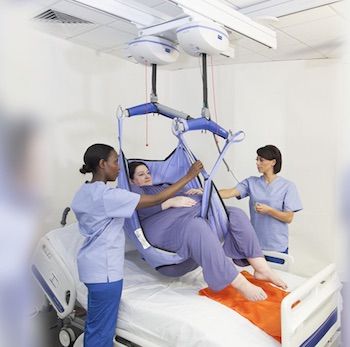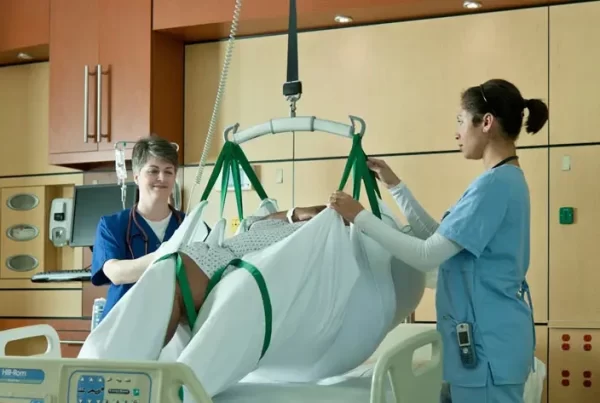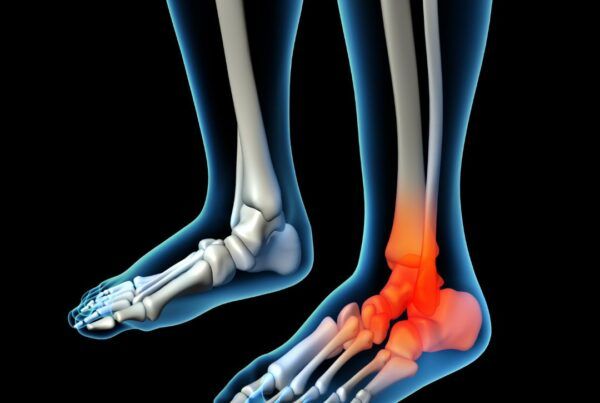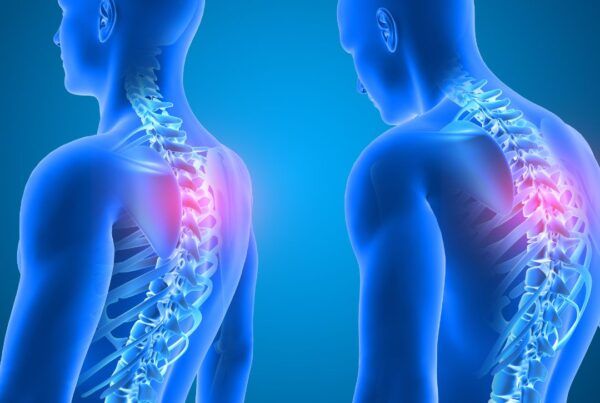Providing care for bariatric patients in hospital settings introduces a range of unique challenges that require special consideration. Awareness of these risks is essential, as a thorough risk assessment and safe moving and handling techniques are vital in limiting the risk of injury for both patients and healthcare staff.
In this blog post, we’re diving into the most significant risks that arise as a result of moving and handling bariatric patients and providing some potential solutions for minimising these risks.
Let’s jump in.
1. Increased Risk of Musculoskeletal Injuries
- When handling bariatric patients, there is a significantly higher musculoskeletal injury risk level compared to when handling non-bariatric patients.
- This is primarily due to the pronounced physical strain of lifting, transferring, or repositioning individuals with a higher body mass.
- Inadequate techniques or insufficient equipment can result in back injuries, strains, sprains, and serious accidents.
- This highlights the importance of proper training and resources.
- In addition to this specialised bariatric handling training, staff should be lifting bariatric patients in pairs or groups to reduce the risk of injury. The use of handling and lifting aids is also crucial for mitigating injury risk.
2. Higher Risk of Injuries due to Patient Falls
- Bariatric patients often grapple with reduced mobility and balance issues, rendering them more susceptible to falls during transfers or movement than more mobile patients of a lower body weight.
- This risk should be mitigated with thorough risk assessments and the implementation of appropriate mobility aids to prevent severe injuries such as fractures or head trauma.
- It may also be necessary to consider equipment such as bathroom and toileting aids to reduce the need to move the patient too much, which will lessen the chance of a fall or slip and make sure they’re more comfortable.
3. Increased Likelihood of Pressure Ulcers
- The additional weight of bariatric patients places heightened pressure on specific areas of their bodies, leading to an increased risk of pressure ulcers or bedsores. Ulcers specifically can cause abdominal pain, nausea, and vomiting while also worsening other health issues.
- This underlines just how crucial it is for staff to take measures to prevent these conditions. Regular repositioning of the patient, utilisation of specialised equipment such as pressure-relieving mattresses, and thorough skin inspections are all really important measures for preventing and managing these potentially serious complications.
4. Staff Fatigue and Burnout
- The regular handling of bariatric patients can be physically and emotionally taxing for healthcare staff, potentially resulting in fatigue and burnout.
- Ensuring adequate staffing levels and implementing comprehensive training programmes are key to sustaining patient safety and maintaining the quality of care provided.
- Employers must recognise the unique challenges associated with bariatric patient management and provide the necessary staff support.
- It is important to design tasks with this in mind, ensuring sufficient breaks for staff to recover from mental and physical exhaustion.
5. Lack of Specialist Bariatric Equipment
- Standard hospital equipment often falls short in accommodating the specific size and weight requirements of bariatric patients, making it completely unsafe to use.
- This heightens the risk of accidents during patient transfers and compromises the effectiveness of care.
- Therefore, it’s essential to invest in equipment tailored for bariatric use to improve safety and efficiency during patient handling.
- There is a wide array of bariatric equipment that is often necessary for risk mitigation, such as specialised beds, slings, handling aids, bathroom aids, and more.
6. Limited Training and Education
- Insufficient training on proper techniques for moving and handling bariatric patients is one of the main reasons why many accidents and injuries occur.
- Comprehensive training programmes are crucial, as they support the education of healthcare staff on safe patient handling, the effective use of bariatric-specific equipment, and the unique needs presented by bariatric patients.
In addition to training, thorough risk assessments that are specific to bariatric handling are a vital part of the process of identifying and preventing any injuries or issues from occurring.
7. Staff Shortages
- Inadequate staffing levels can potentially increase the risks associated with moving and handling bariatric patients.
- This is because a shortage of staff can lead to the adoption of unsafe practices or attempts at transfers without proper assistance, increasing the likelihood of accidents and injuries.
- Staff should always lift bariatric patients in pairs or groups to avoid the risk of falls or strains, which may be much harder to do if there are not enough staff members available.
- Not having enough staff also increases each individual’s workload, which can lead to mental fatigue and overworking.
- So, prioritising adequate staffing levels is crucial to maintaining a safe and effective environment for supporting the needs of bariatric patients.
In Summary
Moving and handling bariatric or plus-sized patients can present your team with a range of risks they might not be familiar with or educated about. In order to prevent injuries and ensure both patient and staff safety, it’s vital to adopt a proactive approach towards addressing the risks associated with moving and handling bariatric patients. This should involve contacting industry experts like OFI to receive proper bariatric moving and handling training for your team, encouraging open communication about the challenges/concerns your staff may have when bariatric handling, and ensuring your team has the correct equipment and information to make all their moving and handling tasks smooth and safe.
By acknowledging and addressing the challenges involved with handling plus-sized patients, hospitals can implement safer and more efficient practices, committing to patient safety and dignity, better staff well-being, and a commitment towards continuous improvement in bariatric patient care.








